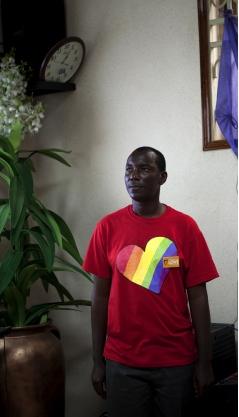This is the 10th in a series of articles from Uganda by Xtra freelance reporter Kaj Hasselriis.
***
Two high-level US diplomats from Washington had a one-hour meeting with gay rights leaders in Uganda to strategize against the country’s controversial anti-gay bill.
“They promised to fight hard to make sure the bill doesn’t go through,” said Brown Kiyimba, a Unitarian minister.
Kiyimba was one of five gay rights leaders at the meeting, which took place on Mar 3 at the US embassy in Kampala. Like Kiyimba, the other four leaders were members of the Civil Society Coalition, a network of Ugandan NGOs that oppose the bill.
The two diplomats who travelled from Washington were from the US Bureau of African Affairs — Geeta Pasi, the bureau’s East Africa director and Bruce Wharton, the bureau’s director of public affairs. They were joined by a Kampala embassy staff member.
“They wanted to know what the embassy and government at large can do to stop the bill,” said Kiyimba.
According to Kiyimba, gay leaders suggested a range of strategies, including imposing economic sanctions on the country and convincing US Evangelicals who are popular in Uganda to speak out more forcefully against the bill.
One member of the Civil Society Coalition even urged a Ugandan visit from US Secretary of State Hillary Clinton, but Kiyimba said the image of Clinton smiling and shaking hands with Ugandan politicians would make it look like she endorses their anti-gay views.
Civil Society members asked the US government to support the coalition’s work against the bill, but no money was promised at the meeting. Diplomats did, however, promise to consider granting American visas to Ugandan gay leaders so they can travel to the US this summer and raise awareness about the legislation.
Kiyimba said the diplomats spoke very little at the meeting. “Mostly they wanted to hear from us,” said Kiyimba.
But US officials expressed specific concern about American investment in the fight against HIV/AIDS. Many people, including members of the coalition, believe that, if the bill passes, it will drive homosexuality in Uganda further underground, making it harder to give safe sex information to gays and lesbians.
The gay rights leaders in attendance also expressed concern about the safety of activists who are getting more and more publicly known for their views — and sexual orientations. “People at the grassroots are insecure,” Kiyimba said he told the diplomats. “We’re becoming known as people who are promoting homosexuality.”
Just walking down the street is becoming scary for some community members, Kiyimba said. He added that, if the bill passes, many people are already planning to flee the country. That led to a short discussion on what the US government might be able to do to help asylum-seekers.
The Obama administration’s opposition to Uganda’s anti-gay bill — which calls for the execution of gays and lesbians who have homo sex more than once, the imprisonment of people who keep gays hidden and the abolition of organizations that advocate for gay rights — is well-known. Clinton spoke with Ugandan President Yoweri Museveni about the legislation last fall, and US President Barack Obama recently denounced it in a speech.
But until now, it was not known that the US government is actively soliciting the views of Uganda’s gays and lesbians.
Kiyimba said he wishes last week’s meeting had happened sooner. “The meeting is a bit late,” he said. “They should have consulted us last fall.”
But he said he was encouraged by the supportive tone of the embassy meeting, as well as the diplomats’ assurance that there would be other get-togethers in the future.
“I take it as a start,” said Kiyimba. “It’s just a beginning. The Obama administration is seriously concerned about the bill and committed to help.”
This reporter sat outside the US embassy in Kampala during the meeting and afterwards and talked to one other participant who confirmed Kiyimba’s account of the meeting’s agenda and tone. Xtra contacted the US embassy for comment but did not receive an answer.
Xtra’s series of reports from Uganda wraps up in two more installments.
Get the latest update as soon it’s posted:
- become a fan of dailyxtra.com on Facebook;
- or follow us on Twitter @dailyxtra.

 Why you can trust Xtra
Why you can trust Xtra


